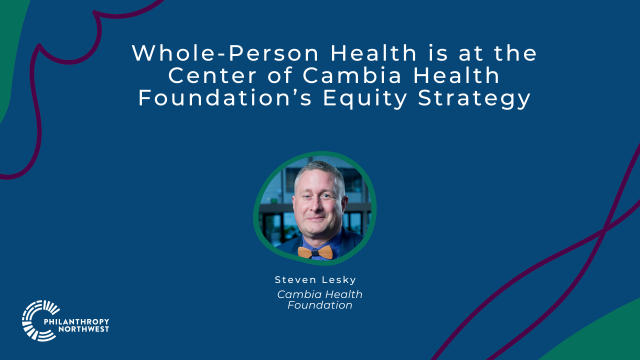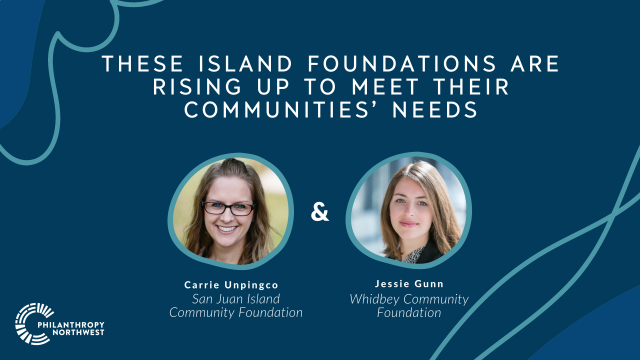Jarrad Aguirre, an MD/MBA student at Stanford University, wrote this post for the Gates Foundation's Impatient Optimists blog.
The Bill & Melinda Gates Foundation is renowned for advocacy and investment in global health and development in addition to U.S. education. As a MD/MBA student, I am very familiar with foundation initiatives to eradicate polio and malaria, among other infectious diseases. It is not uncommon in the classroom or the hospital for medical students and physicians to comment on the latest developments of these important efforts. So, naturally, when I got an internship with the foundation, everyone asked me: Where in global health will you be working?
To their surprise, I explained I would be working with the Washington State team. What excited me most about the foundation was not polio or malaria — but rather the burgeoning emphasis on social determinants and health here in the Pacific Northwest. As my internship comes to a close, I am more excited than ever by this opportunity.
Improving health requires addressing social determinants — forces that fall outside the traditional scope of physicians.
The Affordable Care Act (ACA) is landmark legislation that, at its core, expands access to health insurance. By embracing the expansion of Medicaid, Washington state reduced the uninsured rate from 16.8 percent to 6.4 percent. This accomplishment deserves recognition and praise. But it is critical to acknowledge that health insurance does not guarantee health. Increasingly, commentators point to social determinants — the “conditions in which people are born, grow, work, live, and age” — as the next frontier of healthcare reform.
After all, health is the combined product of socioeconomic status (40%), individual behaviors (30%), clinical care (20%), and the physical environment (10%). I am reminded of this reality when I see patients. There are countless examples of the impact of social determinants on health, including the mother with diabetes who cannot afford healthy food and the young man with schizophrenia who is homeless.
Healthier Washington involves numerous initiatives to address social determinants, while achieving healthier communities, whole-person care, and value-based payment.
Beyond expanding access to health insurance, the ACA created the Center for Medicare & Medicaid Innovation. CMMI is designed to test, evaluate, and expand innovations in healthcare payment and delivery within Medicare and Medicaid. Washington State has launched a 5-year Health Care Innovation Plan — known as Healthier Washington — to transform healthcare at the state level, enabled by a $65 million State Innovation Model grant from CMMI. Healthier Washington involves numerous initiatives to address social determinants, while achieving healthier communities, whole-person care, and value-based payment.
Because education is a key factor in overcoming poverty, the foundation’s Washington State team focuses on the social determinants of educational attainment. Through its involvement with Healthier Washington, the team realized these social determinants are the same as those relevant to health. This realization has spurred increased engagement with healthcare reform — and the ongoing evaluation of opportunities for more strategic activity, increased impact, and new partnerships.
A crucial component of Healthier Washington is Medicaid reform. Washington state is in the process of applying for a Section 1115 Demonstration Waiver. Approved by the Center for Medicare & Medicaid Services (CMS), these waivers provide flexibility and funds to state Medicaid programs. Since 2013, Washington has added more than 550,000 new adult enrollees to Medicaid. The majority of beneficiaries are now adults — and there is an anticipated explosion of demand for long-term services and supports (LTSS) like assistance with activities of daily living.
Washington state is seeking a federal investment of $3 billion to reduce intensive services like LTSS, improve population health, promote value-based payment, and reduce overall costs. Notable provisions include supportive housing and supported employment benefits and “transformation projects” or nontraditional investments in areas like prevention. Accountable Communities of Health (ACHs) — regional coalitions tasked with achieving the goals of Healthier Washington — would serve as coordinating entities for “transformation projects.”
As a soon-to-be physician, I am excited to devote my career to seeing patients. But I recognize that improving health requires addressing social determinants — forces that fall outside the traditional scope of physicians. Before this summer, when I would talk with classmates about the Bill & Melinda Gates Foundation, I would often ask: Why doesn’t the foundation work on health in the U.S.?
This summer, as I interned with the Washington State team, I realized the foundation does in fact work on health. By investing in education and improving systems that reduce homelessness and strengthen communities, the Washington State team addresses social determinants and contributes to the health of children and families.
Healthcare reform in Washington is an unprecedented opportunity for the foundation to do even more. The bold and creative ideas outlined in Washington State’s application for a Section 1115 Demonstration Waiver are exciting developments. Committed to the vision of Healthier Washington, the Washington State team submitted input on the waiver application. To realize the full potential of a waiver, it is vital that ACHs improve community engagement and multi-sector participation and that “transformation projects” look beyond investments in the most expensive adults and invest in upstream social determinants and in children.
Demonstration that a seemingly impossible task is possible.
The eradication of polio, malaria, or any other infectious disease would be historic. One of the benefits of eradication is the demonstration that a seemingly impossible task is possible. There is a parallel with healthcare reform in the Pacific Northwest. Through a Section 1115 Demonstration Waiver and other initiatives, Washington can demonstrate the feasibility, value, and sustainability of addressing social determinants. My time at the Bill & Melinda Gates Foundation is almost over, but I am excited to watch this story unfold — and to tell others that the foundation works on health in its own backyard.
Jarrad Aguirre is an MD/MBA student at Stanford University and will start his residency in internal medicine next summer. This post originally appeared on the Gates Foundation's Impatient Optimists blog.


